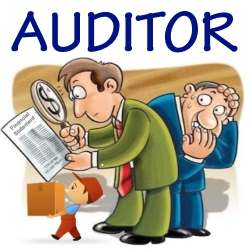Auditing Minute Books of Meetings | Procedure & Guidelines for Auditor
Inspection of Minute Books of Meetings
Every company must record the minutes of all proceedings of general meetings, meetings of the Board of Directors, or of every committee of the Board, in books kept for that purpose. Minute books are statutory books, and are of three types.

1. Shareholders’ Minute Books to record the proceedings of shareholders’ meetings,
2. Directors’ Minute Books to record the proceedings of the meetings of the Board of
Directors, and
3. Committee’s Minute Books to record the proceedings of the meetings of the committees appointed by the Board of Directors.
Audit Procedure and Guidelines to Auditor
The auditor should see that the Chairman of the meeting has certified the minutes as recorded in the minute books. Each page of a minute book must be initialed or signed and the last page of the record of proceedings of each meeting in such books must be duly signed and dated.
If default is made in complying with the provisions of this section, every officer of the company in default shall be punishable with a fine, which may extend to fifty rupees.
The auditor must inspect the shareholders’ minute book to examine the following matters:
1. Adoption of the Statutory Report.
2. Adoption of the Balance Sheet and Profit and Loss Account at the Annual General Meeting.
3. Election of Directors.
4. Appointment of auditors and fixing their remuneration.
5. Issue of shares at a discount.
6. Declaration of dividends and sanction of the sums to be transferred to the reserves.
7. Authorizing the Board to sell or dispose of the undertaking of the company.
8. Rectification of name or adoption of new name by a company where it resembles the name of an existing company with the previous approval of the Central Government.
9. Alteration of share capital.
10. Re-issue of redeemed debentures.
11. Appointment of first directors who are liable to retire by rotation.
12. Increase or reduction in the number of directors within the limit fixed by the Articles.
13. Appointment of managing/whole-time director.
14. Removal of a director and appointment of a director in his place.
15. Approval of appointment of sole-selling agents.
16. Appointment and fixation of remuneration of liquidators in members’ voluntary winding up.
17. Nomination of a liquidator in a creditors’ voluntary winding up.
Similarly, the auditor shall inspect the directors’ minute book to obtain confirmation of the following:
1. Calls made on shares.
3. Declaration of interim dividend and recommendation for final dividend.
4. Exercising borrowing powers.
5. Approval of contracts.
6. Redemption of debentures.
7. Purchase of fixed assets.
8. Transfer to General Reserve and other reserves.
9. Payment of traveling expenses to officials and directors of the company, etc.

